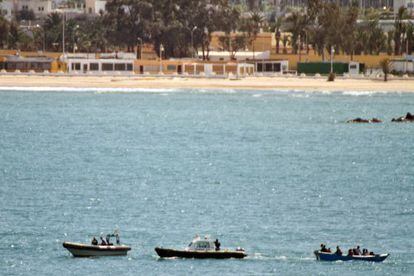NGO condemns illegal towing of immigrant boat to Morocco
Vessel in Spanish waters when Civil Guard dragged it back, say campaigners


An NGO has asked Spain’s ombudsman to investigate an incident in which the Civil Guard allegedly illegally towed a boatload of immigrants back from Spanish to Moroccan waters.
The boat, which had departed from Morocco and was carrying at least 10 sub-Saharan immigrants, approached the beach in the Spanish exclave of Melilla on the North African coast on Friday morning.
Civil guards in a rigid-inflatable boat then towed the migrants back to Moroccan waters, where they were handed over to the authorities there.
Spanish law prohibits the return of immigrants already in the country unless the requisite legal procedures have been followed — even if they entered in an irregular manner. The ombudsman reminds the authorities of this fact in almost all of its annual reports.
The entire incident was caught on video and in photographs by the NGO Prodein, which has now filed a complaint with the ombudsman.
One of the photos shows the migrants’ boat being towed by the Civil Guard with Melilla in the background. Prodein’s José Palazón, who witnessed the incident, says the boat was at most 30 meters from the shore and in Spanish waters, with the beach at Melilla easily visible in the photograph. But the Spanish government’s delegation in Melilla says the boat was never in Spanish waters, having been intercepted “on the high sea.”
A spokesman said the beach appeared so close due to a perspective problem
According to a delegation spokesman, the agents saw the boat, came to its aid in line with maritime rescue regulations, and the Moroccan authorities later took charge of those on board. There was nothing irregular about the handover. The spokesman said the fact that the beach appeared so close in the photo might be the result of a perspective problem.
The question of how far Spanish waters reach around Melilla is a confusing one. According to material from the Diplomatic School found on the Ministry of Foreign Affairs’ website, if it were not for the breakwater outside of the nearby Moroccan port of Beni Enzar, “which enters into unquestionably Spanish waters,” the territorial sea around Melilla would stretch equidistantly for 12 nautical miles. But as it is, bearing in mind the breakwater, the equidistant limits stretch “around seven nautical miles from the mouth of the port,” it says.
Prodein has already slapped the government’s wrists over the illegal handing over of migrants in its most recent annual report. The arrival of a group of 83 migrants on the Isla de Tierra, part of the Spain-owned Alhucemas Islands situated west of Melilla, last year prompted the intervention of the ombudsman after complaints from several NGOs. The pregnant women and children in the group were moved to Melilla, but the others were directly handed over to the Moroccan authorities under cover of night, and were thus unable to make any individual pleas for asylum. The ombudsman’s report stated that the government’s actions had violated current legislation.
Separately, the Spanish Coastguard on Monday intercepted four boats in the Strait of Gibraltar containing 35 would-be immigrants, all apparently sub-Saharan in origin. In the same waters two people, a man and a woman, disappeared, presumed drowned, on Saturday when the inflatable craft they were traveling in capsized three miles off the coast of Tangier.










































